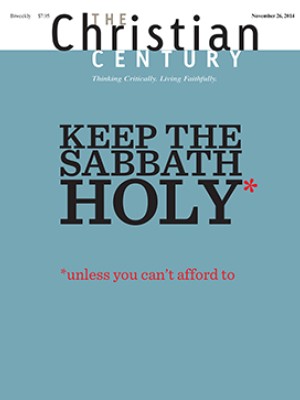The war against rest
"Remember the sabbath" is a costly commandment. Our culture’s assault on it extends far beyond Sunday.

Maria Fernandes died for the sake of a nap. The 32-year-old held three part-time jobs, and between shifts at two different Dunkin’ Donuts locations she stopped in a parking lot in Elizabeth, New Jersey, to sleep in her car. Fumes from a spilled fuel container that had tipped over—she worried about running out of gas—and exhaust from her vehicle ended her life on August 25. According to her manager, this was the first time Fernandes failed to show up or answer her phone. Her friends remembered a generous, sentimental, spirited young woman.
Fernandes was part of what economist Joe Seneca calls the “real face of the recession”: 7.5 million American workers cobbling together a living from part-time jobs. While the shortage of full-time jobs at adequate wages is a familiar story in America’s lingering downturn, the cruel shortage of sleep is not.
Read our latest issue or browse back issues.
It should be. “A battle against leisure is unfolding,” Ryan Jacob claims in a Pacific Standard article called, provocatively enough, “Are Sundays Dying?” Citing Canadian survey data, Jacob found that even in this last citadel of repose, religious observances, socializing, eating at home, and, yes, sleep had all declined on Sundays between 1981 and 2005. During the same period, time spent working increased dramatically.
Churches have, in a manner of speaking, taken notice. Late rising and the newspaper, once the frequently cited competitors to Sunday worship, have been replaced with youth sports leagues. But sports are only part of the story. Rest is leaking out of the world through work, too. Maria Fernandes died after a Sunday night graveyard shift. An online fund-raiser covered her burial expenses.
In recent years, there has been a swell of interest in sabbath observance among American Christians. The influential 1997 collection Practicing Our Faith included Dorothy Bass’s essay on sabbath, while Ched Myers’s 2001 book The Biblical Vision of Sabbath Economics highlighted the communal dimensions of the practice. More recently, MaryAnn McKibben Dana’s Sabbath in the Suburbs (2012) addressed the practical realities of sabbath observance, while Walter Brueggemann’s Sabbath as Resistance (2014) interpreted the sabbath command as central to the economic ethic of the Old Testament and of Christianity, in sharp contrast to the unceasing economic demands of other ideologies. This summer, Christianity Today published a series on the sabbath. This renaissance in sabbath-keeping—or more precisely in the idea of it—is a welcome corrective to the accusation of legalism or ritual formality that has long haunted Christian discussion of the (characteristically Jewish) sabbath.
But this revival focuses, perhaps inevitably, on the family, the home, and the sacred community as the place in which the gift of the sabbath is received. Even Brueggemann, despite his consistent economic focus, laments that “‘soccer practice’ invades the rest of the day” and calls on Christians to resist the “seductions” of an exploitative world “by discipline, by resolve, by baptism, by Eucharist, and by passion.” In other words, this sabbath revival is a renewal of sabbath piety, and a needed and welcome one. It’s no substitute, however, for direct engagement with sabbath politics.
The war on leisure, after all, extends beyond Sunday. Commerce and work, and the political power that gathers around them, are eroding the concept of sabbath—of divinely ordained rest—in every aspect of life. The erosion of idleness is active just below the surface of many of our policy debates over work, family, and retirement.
The current debate over the minimum wage—President Obama and several state-level officials are trying to increase it—is ultimately about whether workers ought to have time for anything but work. Working 40 hours a week at minimum wage doesn’t provide enough income to meet the basic necessities of life, especially for a family. Some defend this state of affairs on the assumption that minimum wage workers are young and still dependent on parents for housing and health insurance. But if this was ever the case, it isn’t anymore. According to the Economic Policy Institute, 28 percent of minimum wage workers have children, more than half work full time, and nearly nine out of ten are over the age of 20.
The idea that the price of labor should be allowed to fall below the cost of life’s necessities is, among other things, antithetical to the ethics of the Old Testament. It is of course possible to work more than full-time to make ends meet, and many people do just that, including Los Angeles school custodian Raul Meza. But this can only be tolerated if we believe human life is meant to serve labor markets and not vice versa. “When I think about making $15 an hour,” Meza writes in the Washington Post, “I think mostly of the time that money could buy with my son.” (Theoretically, there are other policy solutions here besides minimum wage increases, such as the universal basic income proposed by policy wonks on the right and left alike.)
Meanwhile, wage and hour laws are becoming ever less relevant to a workforce increasingly composed of freelancers, contractors, the self-employed, the exempt salaried, and the adjunct. According to one estimate, fully a third of the U.S. workforce operates at least partly on a freelance basis. Then there are the workers improperly classified as independent contractors by employers who want to avoid paying payroll taxes and benefits. And for salaried workers in the “knowledge economy”—however well or reliably paid—work can break into life anywhere, at any time, and without notice. Of course, socializing, shopping, or screwing around online while at work—something Brigid Schulte memorably calls “crappy little bits of leisure-time confetti”—are easier now, too. Continual idleness and continual effort alike now require great patience and deliberateness.
The war on leisure is shaping family policy as well. The United States is currently the only developed country that does not guarantee paid parental leave to workers. Last year a bill was introduced in Congress that would have provided up to 12 weeks of partially paid medical and parental leave. It was promptly stymied by ferocious resistance from business lobbies. Local and state laws providing paid sick leave to workers have been prevented or repealed after intense lobbying (and campaign contributions) from business groups.
Even the appallingly modest legal protections for pregnant workers do not operate as intended. A recent spate of terrifying complaints against Walmart—the nation’s largest private employer—for mistreatment of pregnant employees forced even that famously hardline company to make some small (but highly touted) changes to its policies. And Walmart is not alone; the Equal Employment Opportunity Commission has found that violations of laws protecting pregnant workers fall most heavily on those in lower-wage industries. In today’s politics, when the interests of family conflict with the demands of employers, the family tends to lose.
Even the unending debate over the Affordable Care Act has been shaped by this conviction that work, and not family life, is an end in itself. When the Congressional Budget Office found that the ACA’s subsidies for individual health insurance would allow some people to work fewer hours or even retire without waiting till they were eligible for Medicare, opponents cited this as evidence of “job loss.” But it wasn’t an elimination of jobs the CBO was forecasting; it was highlighting, rather, the link between full-time work and health insurance and noting that the security of affordable health insurance would allow people to shift from paid work to rearing children or simply relaxing after decades in the workforce. Astonishingly, this was treated as a looming disaster.
Finally, retirement itself is under attack. Public pensions are being cut dramatically, often in states governed by Democrats. Proposals to cut back on Medicare’s guarantee of health coverage for senior citizens are a perennial feature of the budget proposals by House budget chair Paul Ryan. In budget negotiations with the House, President Obama repeatedly offered a new way to calculate Social Security benefits that would, over time, substantially reduce the retirement income of low- and middle-income Americans. (He was, thankfully, unable to make such a deal.)
The appeal of entitlement reform to centrist politicians, editorial writers, and advocacy groups like the Peterson Foundation and Fix the Debt is, thus far, lost on the electorate at large. But it won’t go away, in part because it is based on a compelling half truth. We must cut Medicare and Social Security, the story goes, because if we don’t, rising health-care costs and an aging population will overwhelm the federal budget. The second part is certainly correct. But if we don’t do something about our aging population—by encouraging fertility and/or allowing more immigration—our whole economy will be in trouble, not just the federal budget. And if we don’t find a way to reduce health-care costs overall, cutting Medicare will only shift those costs onto families.
The result in either case is the same. People will have to spend more of their lives in the labor market and less caring for grandchildren, watching the sunrise, or running the church altar guild.
There is, it must be conceded, a compelling reason for the war on leisure. Forcing people to work more will, in general, lead to greater economic growth. In that sense, what Brueggemann calls the gods of the commodity economy have been productive, if also cruelly demanding. A person who is sleeping or having sex or cooking dinner for friends or singing a hymn is not doing anything to increase the GDP.
But in the single-minded pursuit of economic growth, we risk losing something essential to human life. In the case of the week, it is what scholars of religion have called the “sanctification of time,” the punctuation of the ordinary with the special. In the case of family leave and retirement, it is the “sanctification of life,” the idea that conditions such as pregnancy and childbirth, sickness, and old age are to be honored for their own sake. Honoring time and life comes with a dollars-and-cents cost, compensated primarily by spiritual and cultural benefits—benefits our politics aren’t good at recognizing or protecting.
At the heart of the matter is the sabbath itself. Foreshadowed in the creation story, God’s command to rest sets Israel apart from the Exodus onward. It is a costly command. The people, their foreign residents, and even the animals must rest. The land must rest. The widow must be released from her debt—at least for the length of a night’s sleep—and from the incessant demand to work in repaying it. Isaiah rails against the abuse of the sabbath to gain competitive advantage, which undermines the ability of anyone to enjoy rest. This mandated idleness—15 percent of life—was so costly that it had to be general and it had to be enforced with fierce penalties. But these costs all underscore the drastic, unyielding, world-shaking claim that life—even the life of an ox—is in some sense its own end and not an instrument. Idleness is sacred in the Bible because it identifies the world with a living God whose greatest gift is rest and who rescued the people from slavery in a land where no rest was allowed.
“The Sabbath of God is the full return to him of all creatures,” writes Maximus the Confessor, identifying union with God as a kind of rest. It’s a common identification, in the Bible and beyond. Christians transferred the sabbath to Sunday and then argued over the relative places of ritual observance and public amusement. But the heart of the command was still honored. The gradual abolition of debtors’ prisons and indentured servitude, the imposition of wage and hour laws and the provision of basic needs at public expense—all this grew from the economics of the sabbath. This reduced the value of debts and increased the value of labor.
“The Sabbath,” writes Abraham Joshua Heschel, “is a day for the sake of life.” And this tradition—Heschel calls it a “palace in time”—that Judaism fought so hard to preserve set up outposts in the rest of life.
These outposts are what the war on leisure is dismantling. And churches—by hoping, urging, or demanding that the faithful cut back on their commitment to travel hockey leagues—risk becoming mere bystanders. The ethos of the sabbath goes much deeper than an individual commitment to prioritize worship. It includes all of those sacred practices, both affirmations and prohibitions, that have been kept alive in Judaism and are being fitfully recovered by Christians. It includes consciously embodying an alternative to the jealous ideologies of modern life—starting, perhaps, with sleep itself.
It will take more than individual piety for us to avoid permanent exile from time’s palace. We will need a sabbath politics and a sabbath advocacy. We will need a commitment to life as its own rationale, its own form of wealth, its own glory.
This article was corrected on November 18, 2014, to correctly identify the Peterson Foundation, not the Peterson Institute, as a group that advocates for entitlement reform in the U.S.





